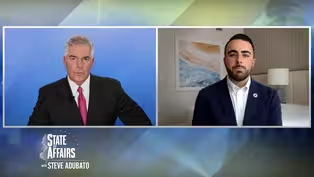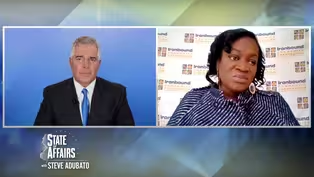State of Affairs with Steve Adubato
The Importance of Civil Education and Discourse
Clip: Season 7 Episode 30 | 9m 52sVideo has Closed Captions
The Importance of Civil Education and Discourse
Director of the Eagleton Institute of Politics at Rutgers University-New Brunswick, Elizabeth Matto, Ph.D., joins Steve Adubato to discuss the importance of civil education and discourse and the current state of our democracy.
Problems playing video? | Closed Captioning Feedback
Problems playing video? | Closed Captioning Feedback
State of Affairs with Steve Adubato is a local public television program presented by NJ PBS
State of Affairs with Steve Adubato
The Importance of Civil Education and Discourse
Clip: Season 7 Episode 30 | 9m 52sVideo has Closed Captions
Director of the Eagleton Institute of Politics at Rutgers University-New Brunswick, Elizabeth Matto, Ph.D., joins Steve Adubato to discuss the importance of civil education and discourse and the current state of our democracy.
Problems playing video? | Closed Captioning Feedback
How to Watch State of Affairs with Steve Adubato
State of Affairs with Steve Adubato is available to stream on pbs.org and the free PBS App, available on iPhone, Apple TV, Android TV, Android smartphones, Amazon Fire TV, Amazon Fire Tablet, Roku, Samsung Smart TV, and Vizio.
Providing Support for PBS.org
Learn Moreabout PBS online sponsorship[INSPRATIONAL MUSIC STING] - Hi everyone, Steve Adubato.
We kick off this program talking about democracy and whether we're in danger or not.
We're joined by Dr. Elizabeth Matto, who's director of the Eagleton Institute of politics at Rutgers University New Brunswick.
Doctor, good to see you.
- Good to see you.
Thanks so much for having me.
- Let me disclose that I am a proud fellow alum of Eagleton, a great institution.
- Thank you, we're proud to have you as an alum.
- Thank you, appreciate that.
Let's get right into this.
I insisted that we put the graphic Democracy in Danger up without a question mark because by any reasonable standard, we are in danger.
What is, from your perspective, and Eagleton is an institution focused on public policy, training those to go into public service, I being one of them back in the 80s.
That being said, the greatest threat to our democracy as you see it is?
- I think lack of attention to the state of our democracy.
I think my biggest concern is, you know, we've had years and years, generations almost, with young adults who really haven't had the civic education the previous generations had.
So I think what's imperative is that students have a really good sense of, not just how to participate in American democracy, critically important, but what the norms, what the values, what the attitudes of being a democratic citizen are, lower case D democratic citizen.
So I think that's my biggest concern is that there isn't necessarily a shared sense of what it means to have a liberal democracy, one that values freedom of speech, the rule of law, equality.
I think those, that's probably my greatest concern, but that's what gives me the greatest hope in that I know an institute such as Eagleton, or higher education in general, can make a difference, can make a positive difference in equipping the next generation of citizens.
- You have a new book.
- I do.
- The title and the message please.
- The new book is called "To Keeping the Republic "Thinking, Acting, and Voting Like an American Citizen".
It's coming out in the spring by Rutgers University Press, and in many ways, it's about this.
It's about this notion of American Democracy is fragile.
We shouldn't take it for granted, and it needs sustained.
But the hopeful message is that we have a role to play in sustaining our democracy.
And so really what it does is examines the various concepts, the various facets of democracy.
Not only how we think about it, how we participate in it, but even just talking to each other.
I think an under-examined skill is democratic discourse, civil discourse.
Certainly it's not frequently modeled and so it needs taught.
And here at Eagleton on campuses across the country, there's a greater effort on preparing, equipping students to have difficult conversations.
- So let's try this.
I have difficult conversations every time we have someone on who happens to be Republican; elected official, member of Congress, state legislator.
And I ask the same question every time.
People wonder, why are you asking that?
A, is Joe Biden the legitimately elected President of the United States in 2020?
Did Donald Trump lose that election?
They're like, why are we talkin' about that?
And my argument is, you can't move on to other things until you acknowledge that elections, even if there are problems with them, that you trust the results of the election, A.
And B, there's a peaceful transition of power, whether it's a governorship, presidency.
Am I over-estimating the significance of that, Doctor, in terms of democracy in danger, please?
- No, I don't think you're- - P.S.
- I don't think you're over-.
I'm sorry.
- Let me just add this.
70 to 80 percent of those who are polled, whether it's the CNN poll, a lot of other polls, Eagleton has a poll, 70-80 percent of Republicans believe that the election was stolen.
That's another reason I ask, and I apologize for interrupting, Doctor, please.
- No, not at all, and I agree with you.
And I think that goes back to your original question: Is democracy in trouble?
That's a significant concern for the longevity, the health of American democracy.
You know, that really has been the hallmark of American democracy; the legitimacy of elections.
Coming together, looking, you know, in an impartial way at the manner in which an election has been conducted, the results, and coming together to accept the results.
So I think that's a significant concern.
If those storming the capitol on January sixth thought they were expressing their grievances or expressing freedom of speech, that's a concern.
That is a misunderstanding of what American democracy is, and a core value of American democracy.
So I think that is not something that should be glossed over, that should be seen as just maybe a blip.
I think it's a significant concern and back to that's what we need to make sure we're doing with our undergraduates, with the public at large.
It's helping people understand that's not freedom of expression.
That's not protected speech by the First Amendment.
- So you're talking about young people.
- Yeah.
- Before you became the director, you're very involved in programming at Eagleton, and connecting with the young people.
- Yes.
- But also you were talking about elections.
- Yeah.
- So 2024.
I've seen polls, you've seen them as well, Doctor, who say that a higher percentage of younger people, say 20 to 30, are supportive of former President Donald Trump over Democratic President Joe Biden, who will be 86 at the end of his second term, if elected.
A, does that surprise you?
B, why do you think that is?
- Well, I think it's always important to remember we're a year out, right now, from the election.
So making sure we remember, first of all that students, not just students, a lot of people are not completely tuned in yet to the election.
I think it's not uncommon that there's disappointment among the electorate in the incumbent.
Promises that may have been offered may not have always fallen through, you know, may not have come through.
So there's always that sort of disappointment as to have the promises that a certain administration or an elected official made, have they followed through.
So it's not surprising that there's the disappointment.
I also think it's really worth remembering that millennials, Gen Z, don't necessarily have the same party loyalty that previous generations had.
You know, young adults certainly do tend to lean more progressive, but that doesn't automatically translate to voting for a democratic candidate.
- But Doctor, I'm sorry for interrupting.
We're not just talking about a Republican candidate for President.
We're talking about a Republican potential candidate for President likely to win the nomination who has four, as we speak, criminal trials going on, and may be convicted by the time the election is.
And it's not like young people don't know that.
- True.
Yeah, I mean, I won't disagree with you.
I think it's a concern and I think in many ways it's sort of an expression of, not only unease, but disappointment, even anger with American government right now.
I think more often than not, and we've seen it not just in some blips of interest in Donald Trump, in third party candidates, among young adults, I think it's much more an expression, not necessarily of hardcore support that will translate into a vote next year, but just general disappointment and disgust with American politics in general.
And I think the likelihood, I think it's a fairly- I would be surprised if by election day next year, much of that translates into strong support among young adults for Donald Trump, if Donald Trump is the Republican nominee.
I think what's more likely and a concern is that will young adults turn out in the numbers that they turned out in previous elections.
Or will they vote for a third party candidate?
- You know, Doctor Matto has this so right, because the third party candidate, we don't know who that would be, but if it's Robert Kennedy Junior, who seems to be attracting- We don't do political prognostication.
We're policy-centric - Right.
- But Robert Kennedy Junior has very clear positions on policies.
- Right.
- Research it, look it up.
- Right.
- Particularly his policies and views on vaccines.
- Right.
- Younger people drawn to him will see what that means, and I promise we'll have the Director of the Eagleton Student Politics, a great institution that I barely got out of in graduate school, at Rutgers University, Doctor Elizabeth Matto.
Thank you, Doctor, for joining us.
We appreciate it.
- Thanks so much for having me, really enjoyed it.
- You got it.
Stay with us, we'll be right back.
- [Narrator] State of Affairs with Steve Adubato is a production of the Caucus Educational Corporation.
Celebrating 30 years in public broadcasting.
Funding has been provided by The Turrell Fund, a foundation serving children.
Horizon Blue Cross Blue Shield of New Jersey.
RWJBarnabas Health.
New Jersey’s Clean Energy program.
The Healthcare Foundation of New Jersey.
Investors Bank.
PSEG Foundation.
Newark Board of Education.
And by The Adler Aphasia Center.
Promotional support provided by Northjersey.com and Local IQ.
And by New Jersey Globe.
Misconceptions About LGBTQ+ Families & Gender Affirming Care
Video has Closed Captions
Clip: S7 Ep30 | 9m 57s | Misconceptions About LGBTQ+ Families & Gender Affirming Care (9m 57s)
Why Urban Areas Are Hurting in Early Childhood Development
Video has Closed Captions
Clip: S7 Ep30 | 7m 55s | Why Urban Areas Are Hurting in Early Childhood Development (7m 55s)
Providing Support for PBS.org
Learn Moreabout PBS online sponsorship
- News and Public Affairs

Top journalists deliver compelling original analysis of the hour's headlines.

- News and Public Affairs

FRONTLINE is investigative journalism that questions, explains and changes our world.












Support for PBS provided by:
State of Affairs with Steve Adubato is a local public television program presented by NJ PBS

